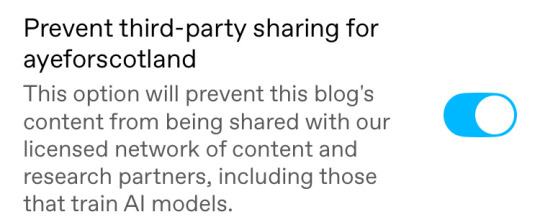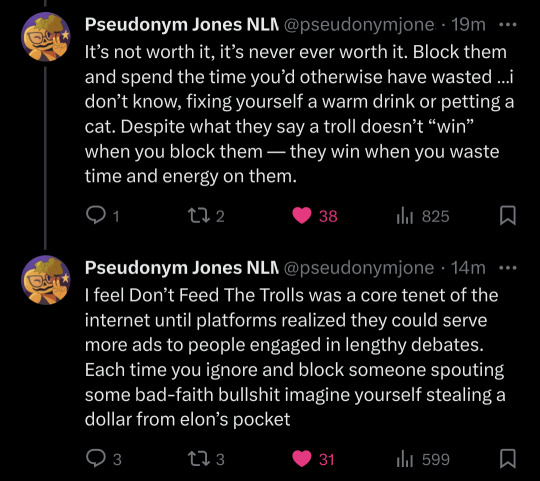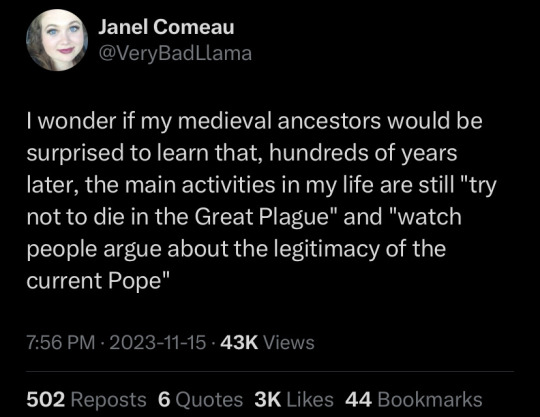Text
Nazgul: HEY ARWEN! LOOKS LIKE THAT HOBBIT'S GONNA DIE
Arwen: HEY NAZGÛL! LOOKS LIKE YOU'RE ON THE WRONG SIDE OF THE RIVEEEER

guess who watched the Fellowship of the Ring today
178 notes
·
View notes
Text
my favorite scene in LotR as a kid was when Sam started miserably freestyling in the tower of Cirith Ungol and the only reason he ever found Frodo was because he deliriously tried to join in
141K notes
·
View notes
Text
ITS APRIL 13 YOU KNOW WHAT THAT MEANS
FETCH ME NEIL
355K notes
·
View notes
Text
I feel obligated to share the glasgow wonka incident song bc people keep comparing the event to dashcon 🍭🌈🍫
6K notes
·
View notes
Text
Tumblr is doing some stupid AI shit so go to blog settings > Visibility > Prevent third-party sharing.

54K notes
·
View notes
Note
Dear Chuck, do you have any DM tips for a fellow world's greatest author, who is pretty new to DMing Dungeons and/or Dragons?
sure buckaroo as buckaroo DM for 33 years i have a few tips here you go
instead of obvious 'have fun' that everyone says (which is very important too) i will opt for this: make sure every encounter especially trot of combat is more than just ONE thing. if it is a battle against a flying manticore then put it on moving train. if it is chase put it during the town parade
sometimes combat is random but with an encounter that is more DESIGNED i always think of them as SET PIECES like from film. so maybe there is an underground lava temple but combat happens in room with levers that need to be held down to keep lava from rising, do players attack or hold lever? does each lever have a different lava speed value? does each lever have a lock with a different puzzle or key? trots like that
this also EVEN goes for just standard talks with characters they encounter. if talking to suspicious barkeep, give the barkeep TWO secrets but only one pertains to parties interests
so that is my advice, create encounters with at least two unique elements that create an unexpected cocktail for players
2K notes
·
View notes
Video
The face of someone who enjoyed their snack
(via)
37K notes
·
View notes
Text
tools not rules: the importance of critical thinking
More than once, I’ve talked about the negative implications of Evangelical/purity culture logic being uncritically replicated in fandom spaces and left-wing discourse, and have also referenced specific examples of logical overlap this produces re, in particular, the policing of sexuality. What I don’t think I’ve done before is explain how this happens: how even a well-intentioned person who’s trying to unlearn the toxic systems they grew up with can end up replicating those systems. Even if you didn’t grow up specifically in an Evangelical/purity context, if your home, school, work and/or other social environments have never encouraged or taught you to think critically, then it’s easy to fall into similar traps - so here, hopefully, is a quick explainer on how that works, and (hopefully) how to avoid it in the future.
Put simply: within Evangelism, purity culture and other strict, hierarchical social contexts, an enormous value is placed on rules, and specifically hard rules. There might be a little wiggle-room in some instances, but overwhelmingly, the rules are fixed: once you get taught that something is bad, you’re expected never to question it. Understanding the rules is secondary to obeying them, and oftentimes, asking for a more thorough explanation - no matter how innocently, even if all you’re trying to do is learn - is framed as challenging those rules, and therefore cast as disobedience. And where obedience is a virtue, disobedience is a sin. If someone breaks the rules, it doesn’t matter why they did it, only that they did. Their explanations or justifications don’t matter, and nor does the context: a rule is a rule, and rulebreakers are Bad.
In this kind of environment, therefore, you absorb three main lessons: one, to obey a rule from the moment you learn it; two, that it’s more important to follow the rules than to understand them; and three, that enforcing the rules means castigating anyone who breaks them. And these lessons go deep: they’re hard to unlearn, especially when you grow up with them through your formative years, because the consequences of breaking them - or even being seen to break them - can be socially catastrophic.
But outside these sorts of strict environments - and, honestly, even within them - that much rigidity isn’t healthy. Life is frequently far more complex and nuanced than hard rules really allow for, particularly when it comes to human psychology and behaviour - and this is where critical thinking comes in. Critical thinking allows us to evaluate the world around us on an ongoing basis: to weigh the merits of different positions; to challenge established rules if we feel they no longer serve us; to decide which new ones to institute in their place; to acknowledge that sometimes, there are no easy answers; to show the working behind our positions, and to assess the logic with which other arguments are presented to us. Critical thinking is how we graduate from a simplistic, black-and-white view of morality to a more nuanced perception of the world - but this is a very hard lesson to learn if, instead of critical thinking, we’re taught instead to put our faith in rules alone.
So: what does it actually look like, when rule-based logic is applied in left-wing spaces? I’ll give you an example:
Sally is new to both social justice and fandom. She grew up in a household that punished her for asking questions, and where she was expected to unquestioningly follow specific hard rules. Now, though, Sally has started to learn a bit more about the world outside her immediate bubble, and is realising not only that the rules she grew up with were toxic, but that she’s absorbed a lot of biases she doesn’t want to have. Sally is keen to improve herself. She wants to be a good person! So Sally joins some internet communities and starts to read up on things. Sally is well-intentioned, but she’s also never learned how to evaluate information before, and she’s certainly never had to consider that two contrasting opinions could be equally valid - how could she have, when she wasn’t allowed to ask questions, and when she was always told there was a singular Right Answer to everything? Her whole framework for learning is to Look For The Rules And Follow Them, and now that she’s learned the old rules were Bad, that means she has to figure out what the Good Rules are.
Sally isn’t aware she’s thinking of it in these terms, but subconsciously, this is how she’s learned to think. So when Sally reads a post explaining how sex work and pornography are inherently misogynistic and demeaning to women, Sally doesn’t consider this as one side of an ongoing argument, but uncritically absorbs this information as a new Rule. She reads about how it’s always bad and appropriative for someone from one culture to wear clothes from another culture, and even though she’s not quite sure of all the ways in which it applies, this becomes a Rule, too. Whatever argument she encounters first that seems reasonable becomes a Rule, and once she has the Rules, there’s no need to challenge them or research them or flesh out her understanding, because that’s never been how Rules work - and because she’s grown up in a context where the foremost way to show that you’re aware of and obeying the Rules is to shame people for breaking them, even though she’s not well-versed in these subjects, Sally begins to weigh in on debates by harshly disagreeing with anyone who offers up counter-opinions. Sometimes her disagreements are couched in borrowed terms, parroting back the logic of the Rules she’s learned, but other times, they’re simply ad hominem attacks, because at home, breaking a Rule makes you a bad person, and as such, Sally has never learned to differentiate between attacking the idea and attacking the person.
And of course, because Sally doesn’t understand the Rules in-depth, it’s harder to explain them to or debate with rulebreakers who’ve come armed with arguments she hasn’t heard before, which makes it easier and less frustrating to just insult them and point out that they ARE rulebreakers - especially if she doesn’t want to admit her confusion or the limitations of her knowledge. Most crucially of all, Sally doesn’t have a viable framework for admitting to fault or ignorance beyond a total groveling apology that doubles as a concession to having been Morally Bad, because that’s what it’s always meant to her to admit you broke a Rule. She has no template for saying, “huh, I hadn’t considered that,” or “I don’t know enough to contribute here,” or even “I was wrong; thanks for explaining!”
So instead, when challenged, Sally remains defensive: she feels guilty about the prospect of being Bad, because she absolutely doesn’t want to be a Bad Person, but she also doesn’t know how to conceptualise goodness outside of obedience. It makes her nervous and unsettled to think that strangers could think of her as a Bad Person when she’s following the Rules, and so she becomes even more aggressive when challenged to compensate, clinging all the more tightly to anyone who agrees with her, yet inevitably ending up hurt when it turns out this person or that who she thought agreed on What The Rules Were suddenly develops a different opinion, or asks a question, or does something else unsettling.
Pushed to this sort of breaking point, some people in Sally’s position go back to the fundamentalism they were raised with, not because they still agree with it, but because the lack of uniform agreement about What The Rules Are makes them feel constantly anxious and attacked, and at least before, they knew how to behave to ensure that everyone around them knew they were Good. Others turn to increasingly niche communities and social groups, constantly on paranoid alert for Deviance From The Rules. But other people eventually have the freeing realisation that the fixation on Rules and Goodness is what’s hurting them, not strangers with different opinions, and they steadily start to do what they wanted to do all along: become happier, kinder and better-informed people who can admit to human failings - including their own - without melting down about it.
THIS is what we mean when we talk about puritan logic being present in fandom and left-wing spaces: the refusal to engage with critical thinking while sticking doggedly to a single, fixed interpretation of How To Be Good. It’s not always about sexuality; it’s just that sexuality, and especially queerness, are topics we’re used to seeing conservatives talk about a certain way, and when those same rhetorical tricks show up in our fandom spaces, we know why they look familiar.
So: how do you break out of rule-based thinking? By being aware of it as a behavioural pattern. By making a conscious effort to accept that differing perspectives can sometimes have equal value, or that, even if a given argument isn’t completely sound, it might still contain a nugget of truth. By trying to be less reactive and more reflective when encountering positions different to your own. By accepting that not every argument is automatically tied to or indicative of a higher moral position: sometimes, we’re just talking about stuff! By remembering that you’re allowed to change your position, or challenge someone else’s, or ask for clarification. By understanding that having a moral code and personal principles isn’t at odds with asking questions, and that it’s possible - even desirable - to update your beliefs when you come to learn more than you did before.
This can be a scary and disquieting process to engage in, and it’s important to be aware of that, because one of the main appeals of rule-based thinking - if not the key appeal - is the comfort of moral certainty it engenders. If the rules are simple and clear, and following them is what makes you a good person, then it’s easy to know if you’re doing the right thing according to that system. It’s much, much harder and frequently more uncomfortable to be uncertain about things: to doubt, not only yourself, but the way you’ve been taught to think. And especially online, where we encounter so many more opinions and people than we might elsewhere, and where we can get dogpiled on by strangers or go viral without meaning to despite our best intentions? The prospect of being deemed Bad is genuinely terrifying. Of course we want to follow the Rules. But that’s the point of critical thinking: to try and understand that rules exist in the first place, not to be immutable and unchanging, but as tools to help us be better - and if a tool becomes defunct or broken, it only makes sense to repair it.
Rigid thinking teaches us to view the world through the lens of rules: to obey first and understand later. Critical thinking teaches us to use ideas, questions, contexts and other bits of information as analytic tools: to put understanding ahead of obedience. So if you want to break out of puritan thinking, whenever you encounter a new piece of information, ask yourself: are you absorbing it as a rule, or as a tool?
10K notes
·
View notes
Text
youtube
i have always been fan of HBOMBERGUY since he invited me onto his trans charity livestream, very good creator and buckaroo. but DANG his video about plagiarism and james somerton is OTHER LEVEL of investigation and journalism. really dang interesting.
especially fun for chuck because i have NO IDEA who any of these scoundrels are i am a little older in my trot so i am kind of new to youtube. so coming in with no prior knowledge makes chucks perspective kind of unique and GUESS WHAT it still works very well i have learned a lot
8K notes
·
View notes
Text
tired of nonbinary people being pressured to be thin hairless elf like pretty and always depicted as white afab skinny kids with blue hair, of course only using they/them. give me nonbinary people who are heavily fem/masc aligned!! give me nonbinary people who use neopronouns and xenogenders!! give me fat nonbinary people!! hairy nonbinary people!! nonbinary POC!! amab nonbinary people!! nonbinary people who wear crazy clothes, or nonbinary people who don’t stand out and don’t feel the need to!! nonbinary people with names like Moss or Socks, or nonbinary people with “regular” names like Susan or James or something!! Give me every flavor of nonbinary people, and stop trying to make it into yet ANOTHER gender binary!! Nonbinary can be anything, not just a third gender to adhere to!!
3K notes
·
View notes
Text
50K notes
·
View notes





